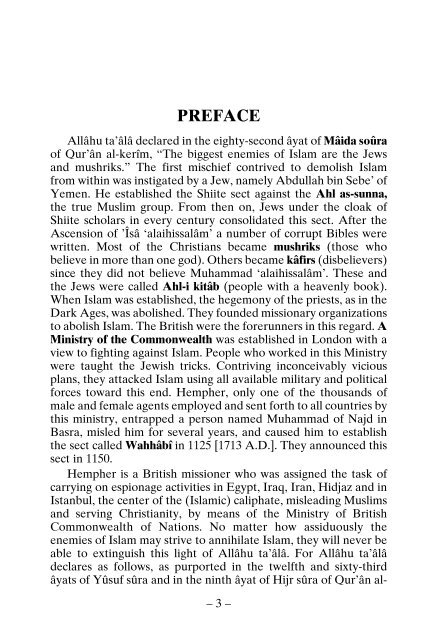Confessions Of A British Spy
Muhammad of Najd was the sort I had been looking for. For his scorn for the time’s scholars, his slighting even the (earliest) four Khalîfas, his having an independent view in understanding the Qur’ân and the Sunna were his most vulnerable points to hunt and obtain him. So different this conceited youngster was from that Ahmed Efendi who had taught me in Istanbul! That scholar, like his predecessors, was reminiscent of a mountain. No power would be able to move him. Whenever he mentioned the name of Abû Hanîfa, he would stand up, go and make an ablution. Whenever he meant to hold the book of Hadîth named he would, again, make an ablution. The Sunnîs trust this book very much. Muhammed of Najd, on the other hand, disdained Abû Hanîfa very much. He would say, “I know better than Abû Hanîfa did. In addition, according to him, half of the book of wrong.
Muhammad of Najd was the sort I had been looking for. For
his scorn for the time’s scholars, his slighting even the (earliest)
four Khalîfas, his having an independent view in understanding
the Qur’ân and the Sunna were his most vulnerable points to hunt
and obtain him. So different this conceited youngster was from
that Ahmed Efendi who had taught me in Istanbul! That scholar,
like his predecessors, was reminiscent of a mountain. No power
would be able to move him. Whenever he mentioned the name of
Abû Hanîfa, he would stand up, go and make an ablution.
Whenever he meant to hold the book of Hadîth named he would, again, make an ablution. The Sunnîs trust this book
very much.
Muhammed of Najd, on the other hand, disdained Abû Hanîfa
very much. He would say, “I know better than Abû Hanîfa did.
In addition, according to him, half of the book of wrong.
Create successful ePaper yourself
Turn your PDF publications into a flip-book with our unique Google optimized e-Paper software.
PREFACE<br />
Allâhu ta’âlâ declared in the eighty-second âyat of Mâida soûra<br />
of Qur’ân al-kerîm, “The biggest enemies of Islam are the Jews<br />
and mushriks.” The first mischief contrived to demolish Islam<br />
from within was instigated by a Jew, namely Abdullah bin Sebe’ of<br />
Yemen. He established the Shiite sect against the Ahl as-sunna,<br />
the true Muslim group. From then on, Jews under the cloak of<br />
Shiite scholars in every century consolidated this sect. After the<br />
Ascension of ’Îsâ ‘alaihissalâm’ a number of corrupt Bibles were<br />
written. Most of the Christians became mushriks (those who<br />
believe in more than one god). Others became kâfirs (disbelievers)<br />
since they did not believe Muhammad ‘alaihissalâm’. These and<br />
the Jews were called Ahl-i kitâb (people with a heavenly book).<br />
When Islam was established, the hegemony of the priests, as in the<br />
Dark Ages, was abolished. They founded missionary organizations<br />
to abolish Islam. The <strong>British</strong> were the forerunners in this regard. A<br />
Ministry of the Commonwealth was established in London with a<br />
view to fighting against Islam. People who worked in this Ministry<br />
were taught the Jewish tricks. Contriving inconceivably vicious<br />
plans, they attacked Islam using all available military and political<br />
forces toward this end. Hempher, only one of the thousands of<br />
male and female agents employed and sent forth to all countries by<br />
this ministry, entrapped a person named Muhammad of Najd in<br />
Basra, misled him for several years, and caused him to establish<br />
the sect called Wahhâbî in 1125 [1713 A.D.]. They announced this<br />
sect in 1150.<br />
Hempher is a <strong>British</strong> missioner who was assigned the task of<br />
carrying on espionage activities in Egypt, Iraq, Iran, Hidjaz and in<br />
Istanbul, the center of the (Islamic) caliphate, misleading Muslims<br />
and serving Christianity, by means of the Ministry of <strong>British</strong><br />
Commonwealth of Nations. No matter how assiduously the<br />
enemies of Islam may strive to annihilate Islam, they will never be<br />
able to extinguish this light of Allâhu ta’âlâ. For Allâhu ta’âlâ<br />
declares as follows, as purported in the twelfth and sixty-third<br />
âyats of Yûsuf sûra and in the ninth âyat of Hijr sûra of Qur’ân al-<br />
– 3 –


